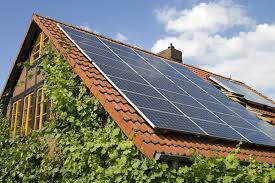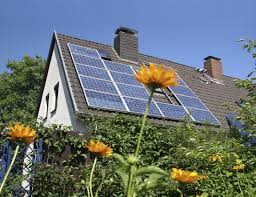 Go Solar California, a joint effort of the California Public Utilities Commission and Governor Schwarzenegger's "Million Solar Roofs" program, had a goal to encourage Californians to install 3,000 megawatts of solar energy systems on homes and businesses by the end of 2016. For larger CA utilities such as PG&E and SCE, the rebates have run out, but for smaller municipal utilities such as the Truckee Tahoe Public Utility District, rebates still exist.
Go Solar California, a joint effort of the California Public Utilities Commission and Governor Schwarzenegger's "Million Solar Roofs" program, had a goal to encourage Californians to install 3,000 megawatts of solar energy systems on homes and businesses by the end of 2016. For larger CA utilities such as PG&E and SCE, the rebates have run out, but for smaller municipal utilities such as the Truckee Tahoe Public Utility District, rebates still exist.
Go Solar California: Municipal Utility Rebates Remain
Mar 25, 2015 8:00:00 AM
Solar Panels Increase Home Value
Mar 18, 2015 8:00:00 AM
 Solar pays for itself in some impressive ways. According to new research sponsored by the Department of Energy, buyers are willing to pay significantly more for homes with solar panels installed. Yearly electricity savings, options to feed electricity back into the grid for credit and a higher home resale value all prove solar is a savvy investment.
Solar pays for itself in some impressive ways. According to new research sponsored by the Department of Energy, buyers are willing to pay significantly more for homes with solar panels installed. Yearly electricity savings, options to feed electricity back into the grid for credit and a higher home resale value all prove solar is a savvy investment.
Interstate Renewable Energy Council: Training, Leading, Advocating
Mar 12, 2015 8:00:00 AM
The Interstate Renewable Energy Council (IREC) is a 501c3 organization that emphasizes expanding consumer access to clean energy, training a national workforce in clean energy installation, and advancing industry-wide best practices. Founded in 1982, IREC is recognized as a national thought leader in furthering renewable energy reach.
Read MoreWhy Cheap Oil Won't Stop Electric Vehicles
Mar 11, 2015 8:00:00 AM
Even with oil at its lowest price in five years, cheap oil can’t stop the growth of electric vehicles - and there are a number of reasons why:
- Early adopters - The price of oil is not the deciding factor for early adopters of plug in technology. Early adopters are willing to pay a premium to be on the leading edge; their buying decisions often inspire and influence others to follow.
- Environmental concerns – Finding new oil fields is becoming increasingly difficult, expensive and devastating to the environment (offshore drilling, Arctic drilling, pipeline construction). Burning oil causes air, water and environmental pollution and is a primary driver of climate change. Environmental concerns and government regulations will help lead the way for clean, green electric vehicles.
- Interest in U.S. energy security – A clean energy grid run on wind and solar that can power your vehicle? It doesn’t get any safer or more secure than that.
- Plug in driving qualities - Electric cars are quieter, smoother, calmer and provide maximum torque from a standstill -- these are qualities which appeal greatly to drivers once they get behind the wheel.
- A wide array of incentives - From tax credits + purchase rebates to carpool-lane access, government support for electric vehicles is growing.
- Inexpensive electricity - Lower gasoline prices, even 40% lower, cannot compare to recharging a plug-in hybrid or battery electric vehicle with super-inexpensive electricity (especially when generated from your own residential solar or wind installations).
- Policy momentum is building in support of zero-emission vehicles. In October 2013, eight states gave EVs a big boost by signing a Memorandum of Understanding on zero-emission vehicles (ZEVs) with the goal of putting 3.3 million electric and fuel cell cars on the road by 2025. Together, these states (California, Connecticut, Maryland, Massachusetts, New York, Oregon, Rhode Island, and Vermont) account for about a quarter of the auto market, so their commitment is significant.
- Gas prices will rise again. It’s just a matter of time.
While some critics say low gas prices will kill electric car sales, in 2014, electric vehicles such as the Nissan Leaf and Tesla Model S saw a 30% increase in sales! It is clear that the cheap gas can’t kill the electric car momentum.
Read MoreClimate Reality Project: Grassroots Activism for a Clean Energy Future
Mar 10, 2015 8:00:00 AM
Founded in 2006 by former Vice President Al Gore, The Climate Reality Project is an organization that sees grassroots activism as the best way to motivate government leaders to take decisive action on climate change.
Read MorePhysicians for Social Responsibility: Advocating for Safe Communities
Mar 5, 2015 8:00:00 AM
Established for more than 50 years, Physicians for Social Responsibility is a 501c3 organization that employs medical and health expertise to protect communities from climate change, toxic chemicals and nuclear proliferation. With a team of scientists, doctors, health professionals and industry leaders, PSR is able to make sound policy recommendations and meaningful research contributions.
Read MorePermanent Extension of Wind/Solar Tax Credits in Obama's 2016 Budget
Mar 4, 2015 8:00:00 AM
 President Obama has made fighting climate change his top priority in the last two years of his presidency - renewable energies would receive new capital investments and existing incentives would be strengthened.
President Obama has made fighting climate change his top priority in the last two years of his presidency - renewable energies would receive new capital investments and existing incentives would be strengthened.
In the fiscal 2016 budget, Obama is proposing $7.4 billion in funding for clean energy (a 7% increase from the 2015 budget) and an additional $4 billion fund to encourage US states to transition away from coal more quickly. The budget highlights a fiscal argument to fight global warming: the United States has taken on over $300 billion in direct costs resulting from extreme weather and fire in the past decade.
Widely applauded by the wind and solar industries, Obama's budget also calls
Read MoreAmerican Council for an Energy-Efficient Economy
Mar 3, 2015 8:00:00 AM
The American Council for an Energy-Efficient Economy (ACEEE) is a robust organization that plays a leading national role in energy efficiency policies, research, education and outreach. From zero net energy homes to transportation incentives, agricultural efficiencies to commercial building codes, the ACEEE provides a wealth of information and resources for those looking to make educated energy efficiency decisions.
Read MoreDSIRE: Database of State Incentives for Renewables & Efficiency
Feb 26, 2015 8:00:00 AM
DSIRE, the Database of State Incentives for Renewables & Efficiency, contains the most current renewable energy and efficiency incentives and policies throughout the US - an important service in the constantly changing incentives field. When a consumer is ready to install a renewable energy system, a federal or state incentive program can significantly lower the obstacles to entry.
Read MoreSolar Energy: Leading the Way in Job Creation
Feb 25, 2015 8:00:00 AM
Jobs are blazing bright in solar: the industry added jobs at a rate nearly 20 times faster than the national average in 2014 according to a recent report released by The Solar Foundation.
"Third-party financing that allows homeowners to lease solar systems, a stabilizing manufacturing sector and utility-scale solar developers scrambling to finish projects before the federal investment tax credit drops from 30 percent to 10 percent on Jan. 1, 2017 has helped drive growth," said Andrea Luecke, president and executive director of The Solar Foundation.
Highlights of the Solar Foundation report include:
- More than 31,000 new solar jobs were created in the U.S. in 2014 bringing the total to 173,807
- This is the second consecutive year that solar jobs have increased by at least 20 percent.
- There are now a total of 173,807 people in the U.S. with jobs related to solar power, a number that’s increased by 87 percent over the last five years.
- Solar added 50 percent more jobs in 2014 than the oil and gas pipeline construction industry (10,529) and the crude petroleum and natural gas extraction industry (8,688) did combined, according to the Solar Foundation.
- Diversity is expanding: in the solar field about twenty-two percent of solar workers in 2014 were female, up from about 19 percent in 2013. About 16 percent were Hispanic and about 6 percent were African-American.
